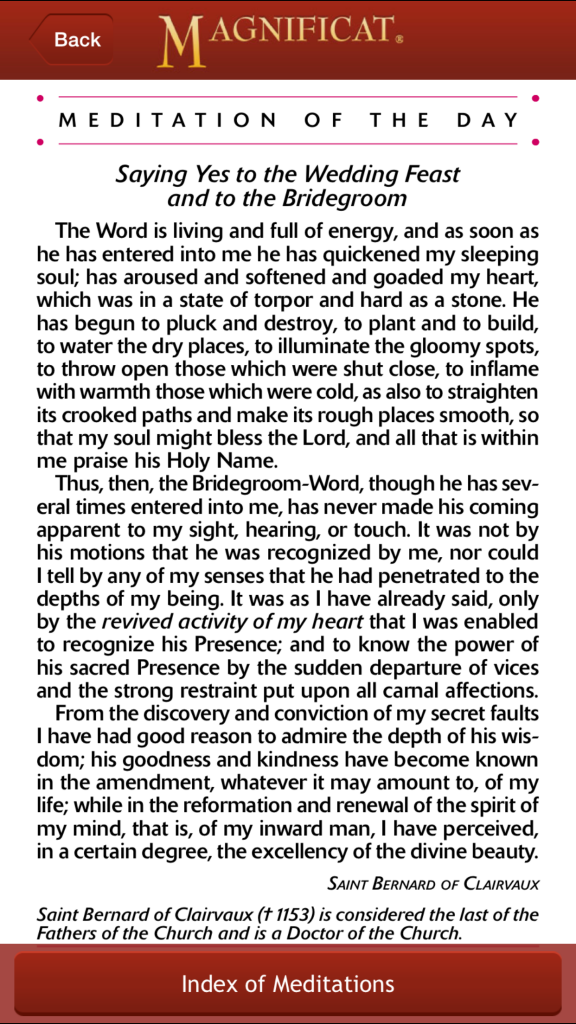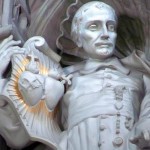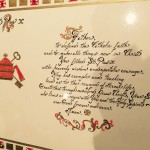1. Today is the feast of Saint Bernard of Clairvaux. Here’s Pope Benedict XVI about him:
St Bernard … solidly founded on the Bible and on the Fathers of the Church, reminds us that without a profound faith in God, nourished by prayer and contemplation, by an intimate relationship with the Lord, our reflections on the divine mysteries risk becoming an empty intellectual exercise and losing their credibility. Theology refers us back to the “knowledge of the Saints”, to their intuition of the mysteries of the living God and to their wisdom, a gift of the Holy Spirit, which become a reference point for theological thought. Together with Bernard of Clairvaux, we too must recognize that man seeks God better and finds him more easily “in prayer than in discussion”. In the end, the truest figure of a theologian and of every evangelizer remains the Apostle John who laid his head on the Teacher’s breast.
2.
The more you grow in grace, the more you are enlarged in faith. (St. Bernard of Clairvaux)
— Cardinal Napier (@CardinalNapier) August 18, 2015
3.
"God removes the sin of the one who makes humble confession, and thereby the devil loses the sovereignty…over the human heart."-St Bernard
— Fr. Dismas, O.P. (@dismasop) August 20, 2015
4. In Magnificat today:
5.
"In dangers, in doubts, in difficulties, think of Mary, call upon Mary" (Saint Bernard of Clairvaux).
— Fr James Bradley (@FrJamesBradley) August 20, 2015
6. From St. Bernard in the Liturgy of the Hours today:
Love is sufficient of itself, it gives pleasure by itself and because of itself. It is its own merit, its own reward. Love looks for no cause outside itself, no effect beyond itself. Its profit lies in its practice. I love because I love, I love that I may love. Love is a great thing so long as it continually returns to its fountainhead, flows back to its source, always drawing from there the water which constantly replenishes it. Of all the movements, sensations and feelings of the soul, love is the only one in which the creature can respond to the Creator and make some sort of similar return however unequal though it be. For when God loves, all he desires is to be loved in return; the sole purpose of his love is to be loved, in the knowledge that those who love him are made happy by their love of him.
The Bridegroom’s love, or rather the love which is the Bridegroom, asks in return nothing but faithful love. Let the beloved, then, love in return. Should not a bride love, and above all, Love’s bride? Could it be that Love not be loved?
Rightly then does she give up all other feelings and give herself wholly to love alone; in giving love back, all she can do is to respond to love. And when she has poured out her whole being in love, what is that in comparison with the unceasing torrent of that original source? Clearly, lover and Love, soul and Word, bride and Bridegroom, creature and Creator do not flow with the same volume; one might as well equate a thirsty man with the fountain.
What then of the bride’s hope, her aching desire, her passionate love, her confident assurance? Is all this to wilt just because she cannot match stride for stride with her giant, any more than she can vie with honey for sweetness, rival the lamb for gentleness, show herself as white as the lily, burn as bright as the sun, be equal in love with him who is Love? No. It is true that the creature loves less because she is less. But if she loves with her whole being, nothing is lacking where everything is given. To love so ardently then is to share the marriage bond; she cannot love so much and not be totally loved, and it is in the perfect union of two hearts that complete and total marriage consists. Or are we to doubt that the soul is loved by the Word first and with a greater love?
7.
Where have Your love, Your mercy, Your compassion shone out more luminously than in Your wounds, sweet, gentle Lord of mercy?
St Bernard
— Fr. Patrick Brennan (@Pathound) August 20, 2015
8.
“Why have I come here?… to lead a holy life"
St Bernard of Clairvaux pic.twitter.com/J8t2xt5fWp
— Fr Brad Sweet (@BradBradsweet) August 20, 2015
9.
Stained glass from the Anglican cathedral in Truro, Cornwall, of St Bernard of Clairvaux https://t.co/rKtQDEkiLX
— Fr Lawrence Lew OP (@LawrenceOP) August 20, 2015
Stained glass from Dartmouth College's Catholic chapel of St Bernard of Clairvaux. Today is his feast day. https://t.co/JeDsbjHZip
— Fr Lawrence Lew OP (@LawrenceOP) August 20, 2014
10.
Where have Your love, Your mercy, Your compassion shone out more luminously than in Your wounds, sweet, gentle Lord of mercy?
St Bernard
— Fr. Patrick Brennan (@Pathound) August 20, 2015
PLUS: Doctor Mellifluus.
Christ who is Light and Truth clarifies good from evil and right from wrong and insists we choose what is good and right.
— FrSteveGrunow (@FrSteveGrunow) August 20, 2015
And: Today’s readings.

















